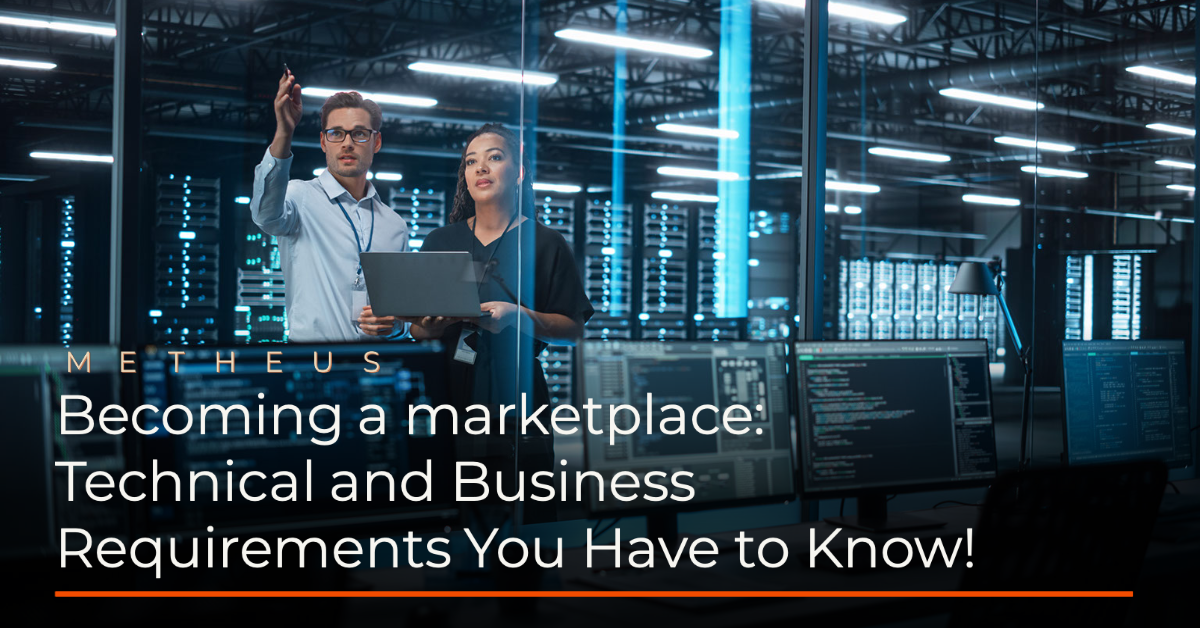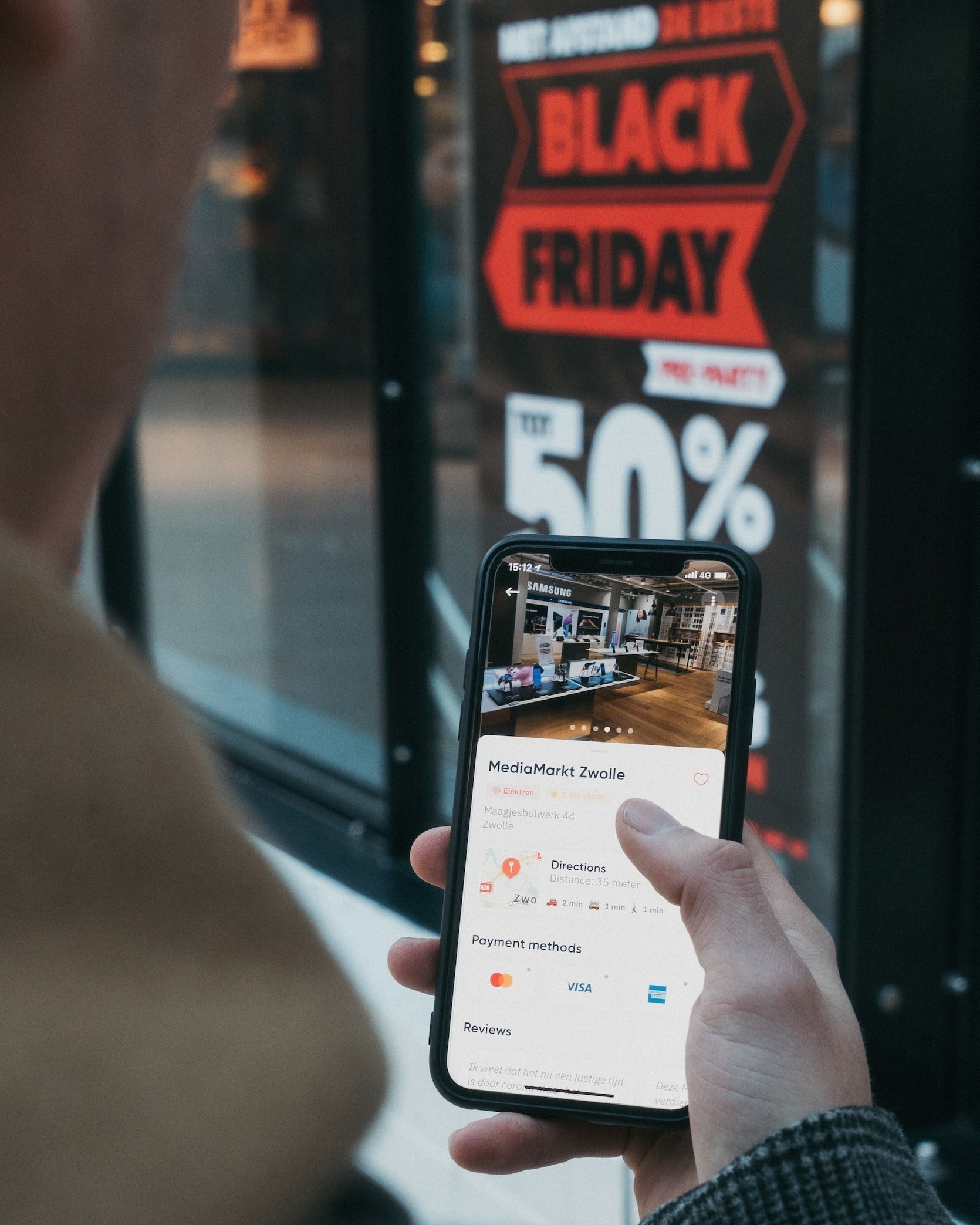Technical and Business Requirements for Building a Marketplace

In recent years, marketplaces have become an increasingly popular way for businesses to sell their products and services online. These platforms bring together buyers and sellers from all over the world, creating a virtual marketplace where products can be bought and sold easily and conveniently. However, becoming a marketplace is not easy and there are many challenges that will be faced when decided to become one.
In our “Becoming a Marketplace” series, our first blog was about what a marketplace is in detail and the different marketplace models. In the second one, we talked about how to do maturity assessment for marketplace evaluation.
When a business decides to become a marketplace, there are many important topics that need to be considered and today, we will talk about them. These topics include technical and business requirements needed to run a successful marketplace. To learn more about them, scroll down!
Business Requirements
Category selection
First of all, it is better and more skilful to start with a smaller selection of products on marketplaces than to make the entire product catalogue available immediately. Preferably, choose products that sell well and are easily recognisable to consumers. Ideally, these initial products should also have good margins and relatively low return rates.

One key factor in establishing a successful marketplace is to identify a specific area of specialization. While some marketplaces offer a wide range of products and services, others focus on specific verticals or niches. Specialization has several benefits, including the ability to reach a more targeted audience, perform more targeted marketing, and offer unique selling points to attract certain types of merchants. However, it's important to keep in mind that too much specialization can result in increased competition among similar merchants. Careful consideration of the marketplace's curation process and the needs of retailers, brands, and merchants in a specific territory is crucial when choosing which marketplace is best suited for their needs.
Consumer Experience
List products correctly: List your product catalogue and make sure that each product is in the right category of the marketplace. The category is essential as it allows e-shoppers to find your products in a targeted manner as well.
Build good logistics: Functioning logistics is at the heart of marketplace success. You can choose to manage logistics yourself to keep costs down or work with an external partner to free up more time for other activities. Some marketplaces also offer their own logistics service.
Collect reviews: Once you start selling, it is important to collect customer reviews. Reviews help persuade other consumers and allow your products.
Use campaigns: Marketplaces offer different promotion and advertising tools to help merchants increase the visibility of their products. Analyse them carefully and choose the tools that you can easily use for the products and brands. The goal with marketing tools is to make initial sales and get reviews. After that, it will be much easier to launch future promotional campaigns.
Analyse results: The analysis of collected data, reviews and feedback is absolutely necessary. This will help you learn from your mistakes or your successes and improve the delivery service, optimise content or think about new advertising campaigns.
Merchant Experience
Retailers and brands are choosing the marketplaces based on these benefits
Size and reach – The main reason for using a marketplace is to reach more consumers, so the marketplaces that can deliver that should be the primary target. However, size isn’t everything, and while reach – geographically, demographically or both – is important, it is only relevant in conjunction with other factors such as specialisation, marketing and other services.
Services – Of a more practical bent, the merchant needs to also asses what they will get from the marketplace or marketplaces they choose. Do the fees include payments processing, marketing, warehousing, inventory and so on? Is there brand protection and fake item policing?
Marketing – The merchant must assess how the marketplace will market their items and what, if any, extra fees that may incur. There must also be clarity over what kinds of extra marketing they themselves are allowed – and not allowed – to do by the marketplace.
Analytics – From the merchant’s point of view, the marketplace needs to be more than just a platform for sales and marketing. It should also provide analytics as to what sells well and where. This is perhaps the most contentious part of the marketplace selling paradigm as it raise the question of ‘who owns the customer?’ Is it the merchant, the marketplace, or both?
Warehousing and pick and pack – Merchant and brands need to assess whether the marketplace does, or can offer, the warehousing, the picking, packing and, as we shall see below, the delivery.
Logistics – The final consideration for merchants is whether the marketplace handles delivery and fulfilment and, if so, how?
Costs and fees – Once all of the above have been weighed, they have to be looked at against cost and fees. How much does it cost to list, sell and operate on the site? This includes scrutinising what is included in the fees and what isn’t.
Technical Requirements
ERP
ERP (Enterprise Resource Planning) platforms are at the heart of any business, serving as the main system of records. ERP systems are used by 26% of employees, providing them with a comprehensive suite of tools to manage the various aspects of a company's operations.
There are couple of modules in ERP systems and the core modules can be stated as,

Financial Management
Accounting
CRM
Payroll
Reporting, Dashboard and Business Intelligence
Inventory Management
Warehouse Management
Order Management
Commerce Connectors
Point of Sale Management
Manufacturing Management
Service Management
When choosing an ERP provider, it's crucial to select one that is knowledgeable and experienced in your industry. This will ensure that the implementation process is smooth and tailored to your specific needs. Furthermore, the system integrator you choose for your ERP system should be competent and able to help you customise your work processes.
For marketplaces, integrating 3rd party merchants into their ERP system is essential. This enables the marketplace to use the ERP's product, order, and other records to distribute and manage their operations. With an effective ERP system in place, marketplaces can better manage their operations, grow their business, and stay competitive in a rapidly-evolving market.
E-commerce Infrastructure
Once the ERP system decided and implemented, the user interface of the whole marketplace is the e-commerce infrastructure. E-commerce platforms plays a strong role in handling thousands of internet users at the website or app at the same time and coordinates the whole other systems in order to provide a great consumer experience which is the second biggest driver of marketplace shopping. With the right e-commerce infrastructure in place, a marketplace can provide a smooth and user-friendly shopping experience that keeps customers coming back.

An e-commerce platform has usually these core modules,
Catalog and Product Management
Basket and Promotion Management
Checkout & Payment
Customer Account
Some e-commerce platforms has these additional capabilities,
Analytics and Insights
Content Management
If you are transforming yourself as a marketplace or building one from scratch, you need to plan your seller catalogue integrations, seller-managed content, pricing and promotion capabilities, post-commission revenue sharing, and any additional services you might add for your merchants.
Payment
Payment management is a crucial and complex aspect of establishing a marketplace. When customers are able to purchase items from multiple merchants in a single transaction, it adds an additional layer of complexity to the payment process. Furthermore, for marketplaces that are not vertically focused on a specific industry or product group, different commission rates may apply to different categories, adding to the complexity of payment management. While selecting a payment provider, it is important to ensure PCI compliance to guarantee the security of both shopper and payment information. Effective payment management is essential to ensure a seamless checkout experience for customers and to maintain the credibility of the marketplace.
A payment platform should include these capabilities to establish a marketplace,
Getting payment from consumers
Dividing the payments based on purchased products and discounts
Applying and managing commission rates and payment period for each seller merchants

In addition to these core capabilities, recently different payment methods and types emerged and became popular by shoppers
Buy now pay later (Klarna)
Digital wallets (Apple Pay)
Cash on delivery
Logistics
After the order is given, the logistics is the first experience of the shoppers from a marketplace.
Logistics operations can be reviewed in 2 categories
Warehouse Management (if the marketplace is not a pure marketplace)
Delivery Management
Warehouse Management
The management of fulfillment and returns becomes a crucial aspect of a marketplace's operations if it plans to sell its own brand or products in addition to those from third-party merchants. For the best experience, immediate integration and update of inventory based on orders, integrated invoicing mechanism, establish a well-thought return processes to get rid of manual workload are the important points for logistics management.
To handle these operations efficiently, marketplaces have the option of setting up their own warehouses or partnering with a third-party logistics (3PL) provider. Working with a 3PL can offer numerous benefits, including expertise and experience in these types of operations. This approach can be especially useful for marketplaces starting out, as it can help to ensure that fulfillment and returns are managed smoothly and efficiently from the outset.
Delivery Management

Effective delivery management is crucial to the success of an e-commerce marketplace. The distribution network of a country plays a significant role in ensuring timely and efficient delivery of products to customers. To provide a positive customer experience, it's important to be transparent about average delivery periods and to provide a tracking link from the delivery company to keep customers informed about the status of their order. By staying ahead of the delivery game, you can increase customer satisfaction and foster customer loyalty to your marketplace.
Seller profiles / accounts
Seller profiles or seller accounts are a crucial aspect of any marketplace platform as they represent the merchants that sell products and services on the platform. It is necessary for the marketplace to have a seamless process for merchants to sign up, manage their products, track sales and communicate with buyers. The following points should be considered when developing seller profiles for a marketplace:
User-friendly registration and profile creation process
Ability for sellers to manage their products, inventory, and pricing
Option for sellers to view and respond to customer inquiries and feedback
Sales reporting and analysis tools for sellers
Secure payment gateway integration for sellers to receive payments
Robust and scalable infrastructure to handle a high volume of sellers and transactions
Having a robust and intuitive seller profile system in place will not only provide a seamless experience for merchants but also ensure that the marketplace is able to attract and retain a large number of sellers, which is essential for the growth and success of the platform.
Additional points (Personalization & Marketing Automation, Customer Support Center, Data Protection & Security)
One of the key aspects of differentiating a marketplace from its competitors is through personalization. This can be achieved through various methods such as offline marketing, digital marketing, on-site personalization, e-mail and SMS marketing, marketing automations and loyalty programs. Each of these methods has its own set of superior providers, and some providers may even specialize in multiple categories.
In order to provide the best possible user experience, it is important to have a unified customer support system. This can be achieved by integrating the customer support center with the e-commerce platform and marketing automation tools. This ensures that users have access to quick and efficient support whenever they need it.
Cybersecurity is another crucial aspect of a marketplace. As the business grows, it becomes more vulnerable to cyber attacks and it is important to take measures to protect the privacy of consumers. This can be done through implementing data protection and security processes within the organization, as well as ensuring that external service providers are compliant and certified in their areas of expertise. These measures will help to ensure that the marketplace remains secure and that consumer data is protected.
Essential Components of a Successful Marketplace
In conclusion, marketplaces have become a popular way for businesses to sell their products and services online, bringing together buyers and sellers from all over the world. However, becoming a marketplace is not an easy task and comes with its own set of challenges.

In this "Becoming a Marketplace" series, we have discussed important technical and business requirements that need to be considered before launching a successful marketplace. These include the selection of an ERP system, the development of an e-commerce infrastructure, payment management, logistics management, and the establishment of seller profiles or accounts.
These components, when combined, will guarantee a smooth and user-friendly shopping experience that attracts repeat business and aids marketplaces in remaining competitive in a constantly changing market. Businesses can position themselves for success in the world of e-commerce marketplaces by attending to these important requirements.
As Metheus Consultancy, we have the necessary experience and a large best practice database to guide you through the entire process of becoming a marketplace. Because we are experts at strategizing and selecting the best options, we can demonstrate which solutions to pick when it comes to these necessary steps to take in order to become a marketplace! Don't forget to contact us if you want to learn more about how we work with our customers to become a marketplace and what we have to offer.
Stay tuned for our upcoming blog about the last steps to becoming a marketplace as well as how to organize your transition to the marketplace!
